Key takeaways:
- Intermittent fasting (IF) can enhance mental clarity, energy levels, and improve eating habits by promoting mindful eating.
- Different methods of IF, such as the 16/8 approach and the 5:2 diet, cater to individual lifestyles and preferences.
- Successful fasting involves essential practices like staying hydrated, planning balanced meals, and having a support system for motivation.
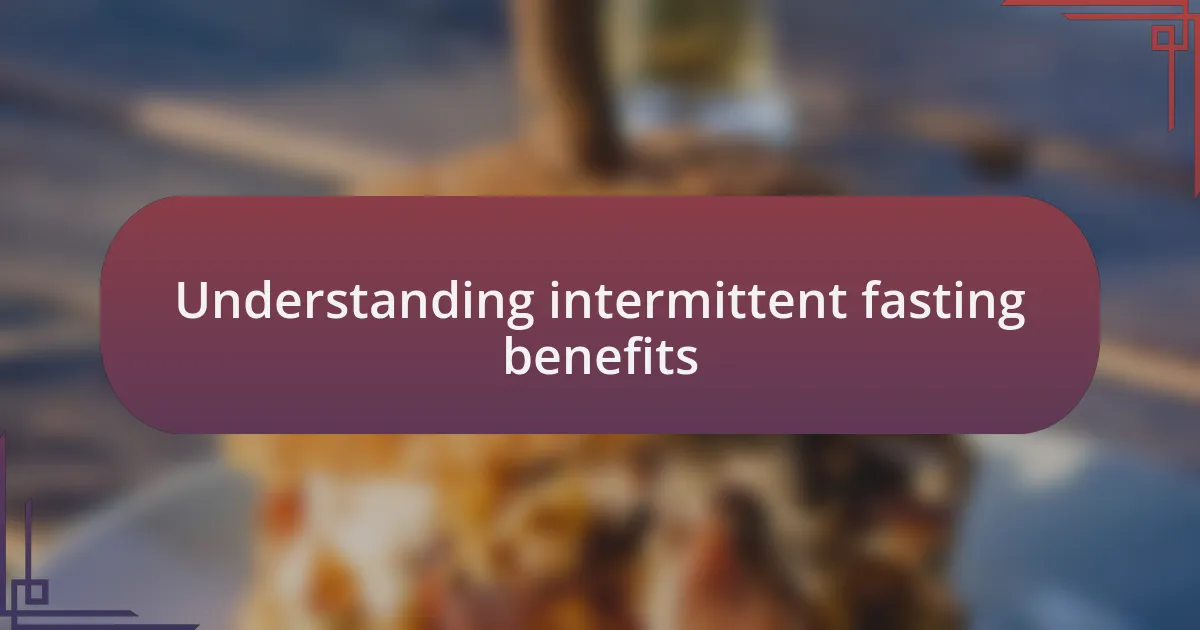
Understanding intermittent fasting benefits
Intermittent fasting (IF) offers various health benefits that caught my attention early on. I started incorporating it into my routine, and what surprised me was how it not only helped manage my weight but also significantly boosted my energy levels. Have you ever noticed how a simple adjustment in your eating schedule could lead to such vibrant changes in your daily life?
One of the fascinating aspects of IF is its impact on mental clarity. There were days when, after a fasting period, I felt sharper and more focused than usual. It made me wonder: how could something as straightforward as a change in meal timing unlock our mental potential? The science suggests that fasting triggers the production of brain-derived neurotrophic factor (BDNF), a protein that supports brain health.
Another benefit I’ve experienced is the improvement in my cravings and eating habits. Initially, I thought fasting would leave me feeling deprived, but I’ve found it surprisingly liberating. Instead of mindless snacking, I started savoring my meals more, leading me to ask: isn’t it interesting how mindful eating can transform our relationship with food? Intermittent fasting taught me to appreciate my meals, turning eating into a more intentional and satisfying experience.
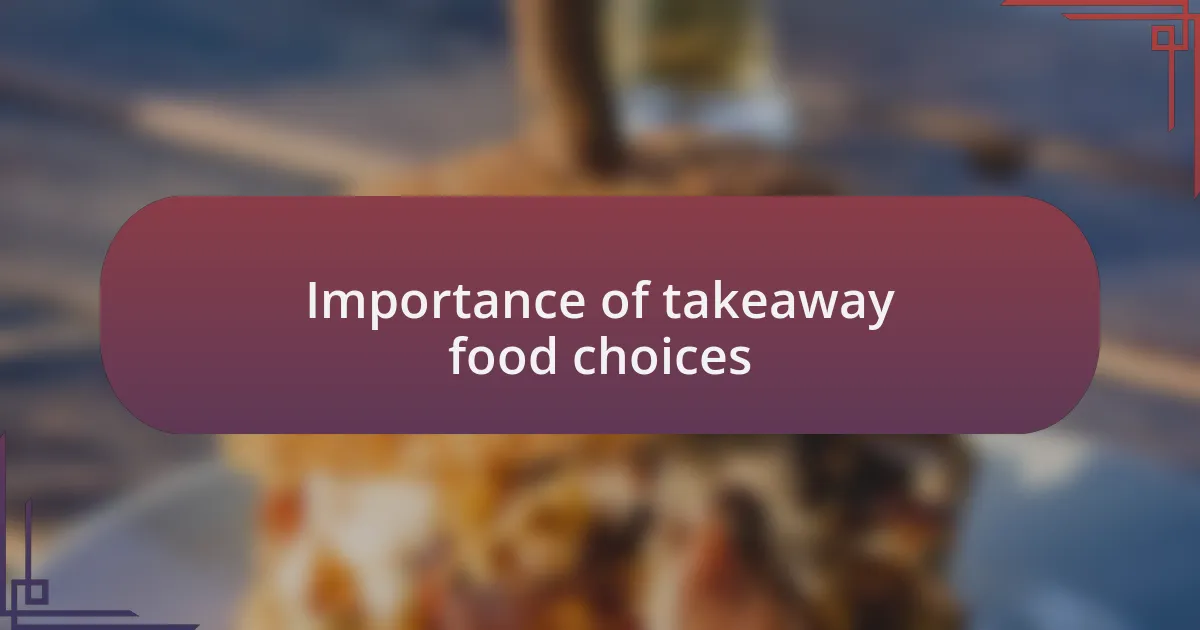
Importance of takeaway food choices
When it comes to takeaway food choices, I often find myself reflecting on the impact they can have on our overall well-being. I remember a time when I frequently opted for quick, unhealthy meals, thinking they were the easiest solutions in my busy life. Eventually, I realized that the quality of my food choices directly influenced my energy levels and mood throughout the day. Isn’t it fascinating how the right selection can transform not just a meal but our entire mindset?
One choice I’ve learned to embrace is looking for takeaway options that balance convenience and nutrition. For instance, swapping a greasy burger for a fresh, vibrant salad topped with lean protein has not just impacted my waistline but also my mental clarity. It’s amazing how such a shift can make me feel more awake and focused. Have you ever noticed how your food choices can affect your productivity levels? The link between what we eat and how we think is more profound than many realize.
Moreover, takeaway food can also reflect our values and priorities. When I consciously choose local and sustainable options, it feels more rewarding than merely indulging in convenience. I recall the sense of satisfaction I get from supporting local businesses and enjoying fresh ingredients. It prompts me to consider: what does my food say about me? The choices I make in takeaway food are not just about sustenance but about aligning my eating habits with my lifestyle and beliefs.
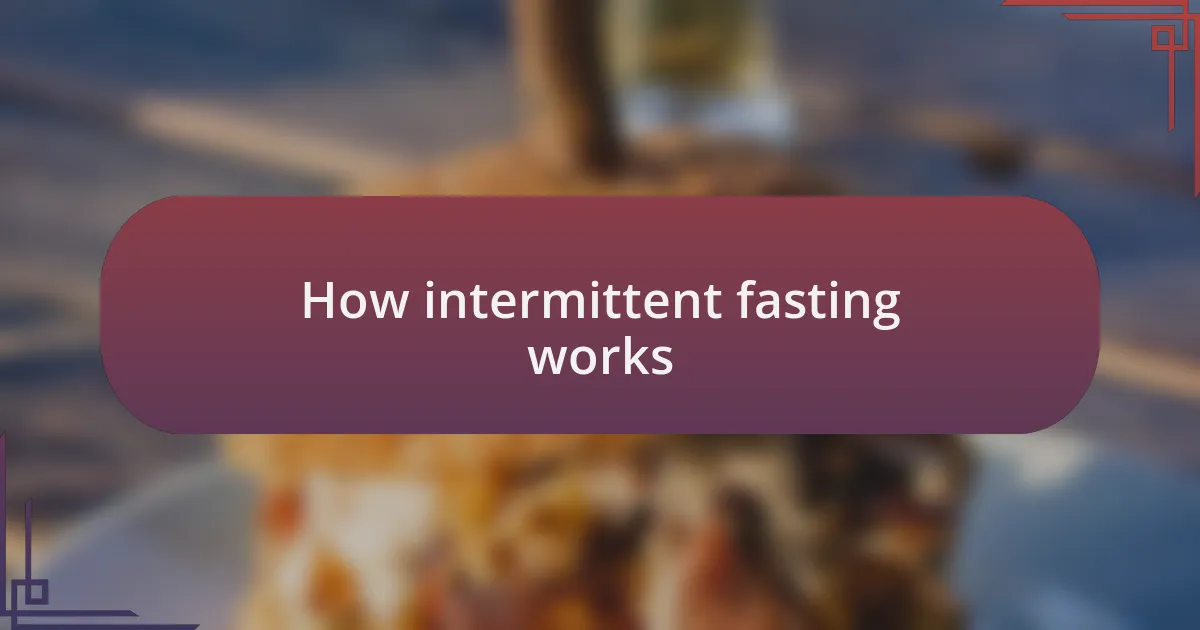
How intermittent fasting works
Intermittent fasting works by altering the timing of food intake rather than restricting what you eat. Personally, I’ve found that this approach has freed me from the constant cycle of snacking and meal planning. By designating certain hours as eating periods, my body shifts into a more efficient state, focusing on energy regulation and fat burning during the fasting hours.
During my own journey with intermittent fasting, I discovered how it encourages my body to enter a state called ketosis. Ketosis occurs when your body runs out of glucose and begins to burn fat for energy instead. I remember feeling more alert and energized during my fasting periods, prompting me to wonder why I hadn’t tried this method sooner. Have any of you felt that buzz of clarity when you give your digestive system a break?
Additionally, I’ve noticed that intermittent fasting can positively influence hormone levels, particularly insulin. With lower insulin levels during fasting, my body benefits from enhanced fat oxidation. This shift has not only impacted my physical health but has also transformed my relationship with food. I now look forward to my designated eating windows, savoring my meals instead of eating mindlessly. Isn’t it empowering to take control of your eating patterns in such a simple yet effective way?
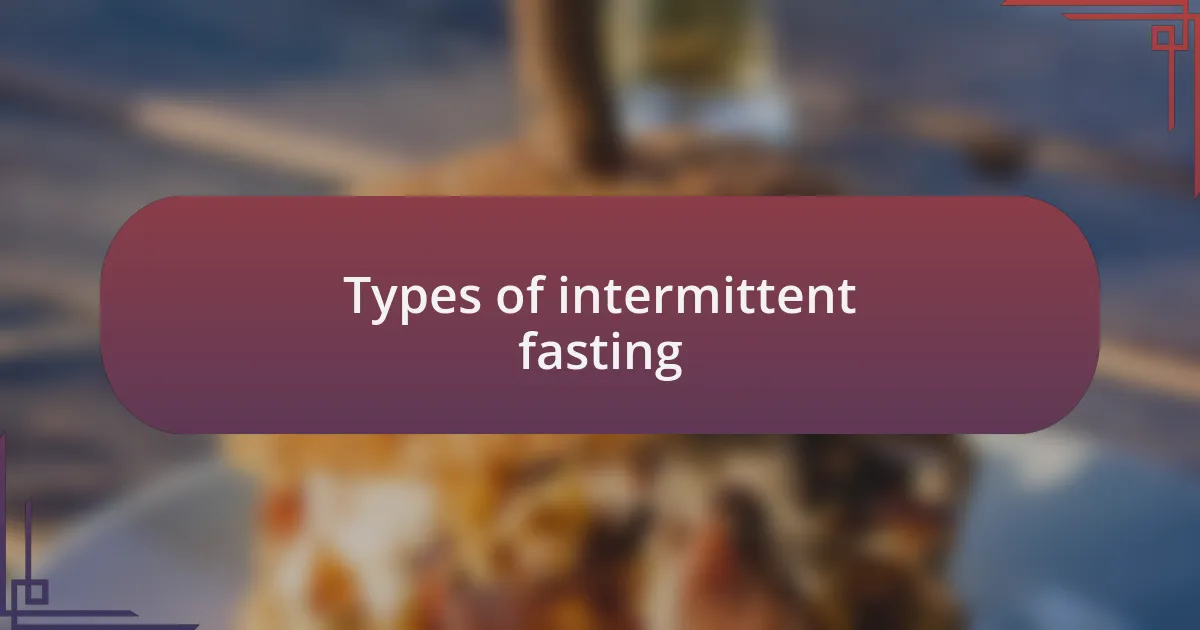
Types of intermittent fasting
Intermittent fasting comes in various forms, each catering to different lifestyles and preferences. One popular method is the 16/8 approach, where I fast for 16 hours and eat during an 8-hour window. This structure often suits me best because it allows me to enjoy a late breakfast and skip dinner, and I find that this flexibility keeps me in sync with my daily routine.
Another method I’ve explored is the 5:2 diet, which involves eating normally for five days and then consuming only around 500-600 calories on two non-consecutive days. I remember the first time I attempted it, I felt a mix of apprehension and curiosity. However, I learned to make satisfying meals using fewer calories, which expanded my culinary repertoire and taught me the importance of food quality over quantity.
There’s also the alternate-day fasting method, where one alternates between fasting days and regular eating days. Initially, I was skeptical about how I could manage such a pattern without feeling deprived. Yet, I was pleasantly surprised by how adaptable my body became, which led me to reassess my relationship with hunger. Have you ever noticed how sometimes, our hunger can truly just be a mind game?
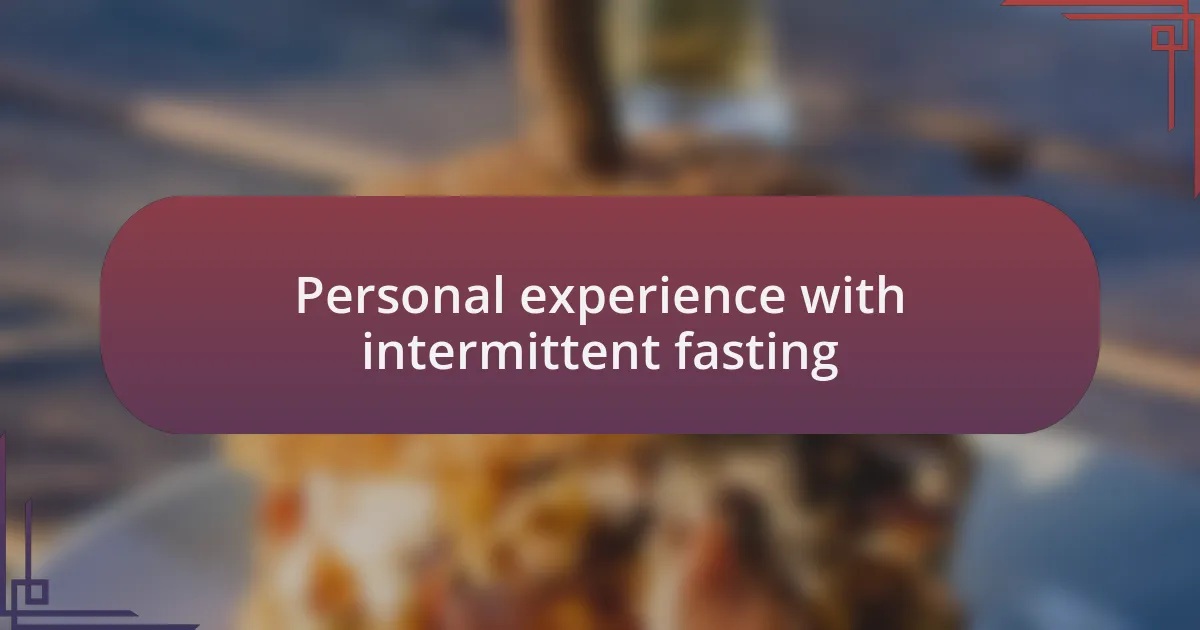
Personal experience with intermittent fasting
Intermittent fasting has profoundly impacted my daily life. For me, it wasn’t just about the physical benefits but also the mental clarity I experienced. I recall one afternoon when I realized how focused I was while working through my fasting period. It felt almost liberating, as if my mind was sharpened and free from the usual post-lunch fatigue.
There was a moment that stood out to me when I attended a dinner with friends while adhering to my fasting schedule. As the delicious aromas wafted around me, I initially felt the familiar tug of temptation. But I found joy in sharing the experience of food without indulging—connecting with friends over their meals while savoring my water. Have you ever found strength in patience? I certainly did.
Over time, I noticed changes in my appetite and cravings. Not only did I find myself enjoying meals more, but I also learned to appreciate the foods I chose to nourish my body. I remember celebrating one of my breakthroughs after a week of sticking to my plan; instead of reaching for snacks mindlessly, I started preparing vibrant, wholesome dishes that excited my palate. It was a delightful revelation that highlighted how fasting can reshape not just eating habits, but also my overall relationship with food.

Practical tips for successful fasting
To enhance your success with intermittent fasting, planning is essential. I remember when I first started fasting, I would often forget to drink enough water. Staying hydrated transformed my experience; I found that having a water bottle nearby not only kept me refreshed but also took the edge off feelings of hunger. Have you ever noticed how something as simple as water can make a world of difference?
Incorporating strategic eating windows is another effective approach. I’ve learned that when I break my fast, preparing a balanced meal filled with protein, healthy fats, and fiber helps keep me satisfied longer. The first time I indulged in a homemade quinoa salad packed with colorful vegetables after fasting, I realized that nourishing my body with whole foods was far more fulfilling than just eating whatever was available. What are some of your go-to meals?
Finally, don’t underestimate the power of a support system. During one of my fasting journeys, I joined an online group where members shared tips and motivational stories. The sense of camaraderie made those fasting days feel less isolating. Have you found strength in community? I certainly did, and it reinforced my commitment each time I faced cravings or felt tempted to stray from my plan.